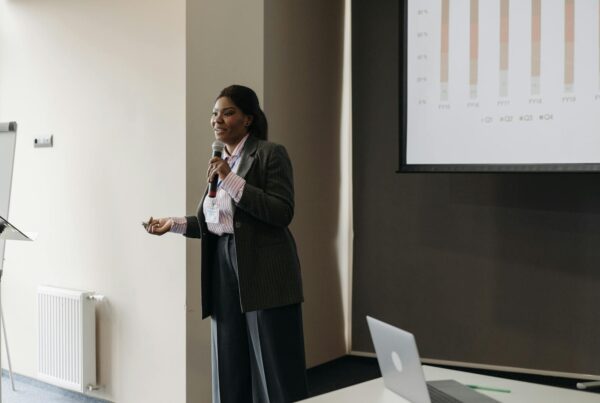The ability to communicate deeply and effectively is the bedrock of any successful relationship, whether in or out of the workplace. If you constantly have to interact with clients, you will come to realize this.
Through years of business interactions, we have learned that communication skills; both verbal and non-verbal, are important to have.
Our aim in this article is to walk you through how to improve your communication skills by providing practical tips and techniques that you can implement.
How to Improve Your Communication Skills
Wherever you find yourself, be it a job interview or business meeting, knowing how to communicate and express yourself comprehensively gives you a clear advantage. If you are in a leadership or managerial position, effective communication is one of the most important skills you need to perform excellently.
It is important to note that communicating involves more than just speaking. It encompasses many things, including the tone of your voice, your facial expressions, and body language. While communicating effectively might seem a bit too difficult, the good news is that it can be mastered in no time.
 What Is Effective Communication?
What Is Effective Communication?
Effective communication involves expressing yourself clearly, concisely, and meaningfully so that the listener accurately understands your intended message. For any communication to qualify as effective, a connection has to be made between the speaker and the audience. This means that beyond speaking, effective communication involves actively listening as well.
A single skill isn’t sufficient to improve your communication abilities. To become an effective communicator, you need to combine different skills and techniques across the various types of communication. The most common forms of communication are:
- Oral/verbal communication
- Non-verbal communication
- Written communication
- Contextual communication or communicating in context
- Visual communication
- Active listening
Why Is Effective Communication Important?
You’re probably wondering, “Why do I have to communicate effectively? Why can’t I just keep communicating the same way I’ve been doing most of my life?” It’s understandable why you might feel that way. However, the importance and benefits of effective communication cannot be overemphasized. Unlock your vocal trinity today, here’s a quick highlight:
- It allows you to build strong relationships, whether in friendships, romance, or professional partnerships
- It allows you to express your feelings and intentions in easy-to-understand messages
- It makes you more productive
- It reduces the risks of miscommunication and the consequences that can arise as a result
- It gives you a better understanding of what other people are saying
- It improves your decision-making
- It makes you a better leader, partner, and/or team member
- It improves your professional image
Tips and Techniques to Improve Communication Skills
Whether you want to improve your communication for your workplace or personal relationships, these 7 tips will help you become a better communicator.
 Be Clear and Concise
Be Clear and Concise
The average audience attention span falls between 5 to 10 minutes. Anything longer than that, your audience might lose interest in what you’re saying. Hence, you need to be as clear and brief as possible. Get to the point of your message as quickly as possible, and avoid using unnecessary words, repetitions, and conversation fillers.
Prepare Your Message Ahead of Time
Before communicating, take the time to organize your thoughts. Plan what you want to convey and how you want to convey it. Also, research potential questions you may get and how to answer them well. This helps you to be more calm and coherent.
Listen Actively
When communicating, listening to your audience is just as important as talking. Practice the following to improve your active listening skills:

- Maintain eye contact
- Provide verbal or non-verbal cues to show that you are engaged
- Avoid interrupting and patiently wait for the speaker to finish before responding
- Paraphrase what you’ve heard to make sure you’re not misunderstanding anything
- Ask questions to get additional information
Read Non-Verbal Cues
Our body language, facial expressions, and tone of voice often go a long way than our words. That being so, you must control your non-verbal cues to make sure they support your message. At the same time, you must be able to read the non-verbal cues of your audience to understand their feelings about your message.
Make Eye Contact
Maintaining eye contact during communication demonstrates attentiveness, sincerity, and confidence. It also builds a sense of connection between you and your listener and may give you insight into what they think about your message. 
Keep Your Audience Engaged
To keep your audience engaged, the first thing you need to do is to tailor your communication to their needs. For instance, if you are talking to high school students, you should use language and expressions they can relate to.
You can also engage your audience by encouraging participation and interaction. Ask questions and invite them to share their thoughts and perspectives. This makes sure that everyone is on the same page.
Choose the Best Method for Message Delivery
Different communication methods, such as face-to-face conversations, emails, phone calls, or presentations, may be more suitable for conveying certain messages or reaching specific audiences. Hence, before communicating, consider the method that best aligns with your message and your audience’s preferences.
Related Questions
What Are Some Common Barriers to Effective Communication?
Common barriers to effective communication include lack of interest, an inability to listen, lack of trust and transparency, differing communication styles, use of overly technical language, hearing problems, and speech difficulties. Some emotional barriers may also come into play, such as anger, anxiety, and fear.
Is Non-verbal Communication More Effective Than Verbal Communication?
In many cases, non-verbal communication is more effective than verbal communication. However, the level of effectiveness depends on the context and situation. Verbal communication conveys detailed or sensitive information, while non-verbal communication conveys emotions and intentions more powerfully. Additionally, non-verbal cues can provide additional layers of meaning than verbal communication.
Does Active Listening Improve Communication?
Yes, active listening improves communication. It involves fully concentrating on what is being said to understand it and respond appropriately. To practice active listening, focus on the person speaking and avoid distractions and interruptions. Wait till they are done to ask questions and respond to what they’ve said.
Conclusion
With our corporate training, improving your communication skills will be an ongoing process that can be achieved with lots of practice. Implement the tips and techniques reviewed above into your communication to become a better communicator.






